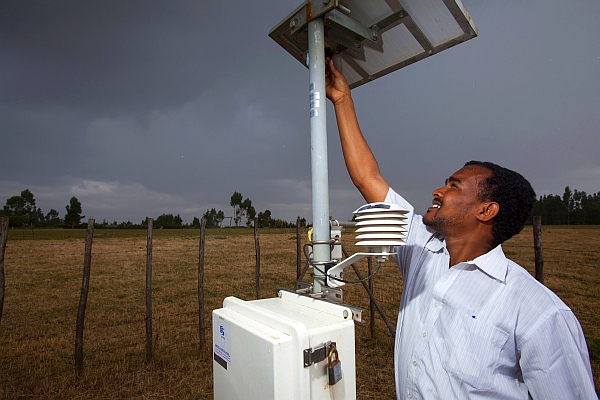Information and communication technologies (ICTs), social media and mobile applications are changing the way we work, interact, think and organise our lives. This is happening regardless of where we live and what business we are in.

So it is no surprise that ICTs are becoming more and more important for rural development in developing countries. Some experts argue that knowledge sharing via ICTs will be one of the most powerful drivers of agricultural growth and transformation in African countries.
However a recent report by the African Development Bank shows that Africa still has a lot to catch up on in terms of growing a globally competitive knowledge economy. Although internet penetration has doubled, the report showed that more than 80 percent of the African continent is still unconnected. This is down to two factors: availability and affordability.
There are limitations
So what does this mean for the ICT and development sector? The Improved Management of Agricultural Water in Eastern and Southern Africa (IMAWESA) project funded by IFAD and coordinated by the International Water Management Institute, is a knowledge management network designed to share knowledge and information on water in agriculture.
It facilitates learning across communities, projects and countries, to improve the impact of agricultural water management interventions. But while a lot of resource material can be accessed through their website, a recent survey conducted by IMAWESA showed that using ICTs alone are unlikely to solve the challenges of uptake.
”It is not that ICT is not of use, we are just recognizing that it does have limitations in Africa”, says program coordinator Nicole Lefore. “There has been much excitement in the development community about the potential offered by new technology.”
The huge popularity of cash transfers by mobile phone in Africa is one good example. But there are also promising developments in agricultural water management, including IWMI’s Smart – ICT project funded by IFAD, which offers timely transfer of weather, water and crop-related information and advice to farmer’s mobile phones.
“But when it comes to sharing knowledge and convincing farmers to adopt new practices, simple dissemination by internet or mobile networks is, at present, not generally sufficient on its own.”
The survey showed that the existing email newsletter that linked to the website was well perceived. However it also showed that on average across several hundred network members, most people liked the email based newsletter, but did not actually like going to the website. Mainly because it is hard for them to download material for several reasons, including weak or limited internet access. But even among those with access that allowed them to download they would not be able to print material and share it due to office restrictions.
The results showed that the use of Social Media was even less popular than websites, ranking at the bottom of how users want to receive information.
A long way to go
Outside of urban areas it was shown that a weak internet infrastructure is even a greater barrier. Which effects implementing staff in the rural areas as they often have no internet connection, but also regional and national coordination and management staff as they cannot share knowledge they have access to online more widely.
“In short, our survey suggested this is very limited particularly for implementers in sharing knowledge in Africa at this point”, says Lefore. “However we do have visitors to the website and we now try to change the format so that it will be easier and faster to navigate. Also, members of the network really do value the newsletter that we send out by email, and they do follow up on links. But we feel that internet availability and affordability needs to improve a lot more before the internet can become a major knowledge sharing tool in Africa.”
Lefore has been impressed, however, with some emerging approaches. Communities of Practice that combine both face-to-face interactions and on-line platforms, including email, are providing project managers and subject specialists with a continuous way to share information and exchange experiences. Additionally, ICT, particularly smart phones, are being used to supplement support to farmers where extension agents are too few or too far from farmers.
These practices are spreading fast and together with increasing access and greater affordability of the web hold a lot of potential.
[hr top=”yes”/]
This piece has been written by Anna Deinhard, Communications Fellow, with contributions from Nicole Lefore, IMAWESA coordinator. For more information about the project, please contact n.lefore@cgiar.org

